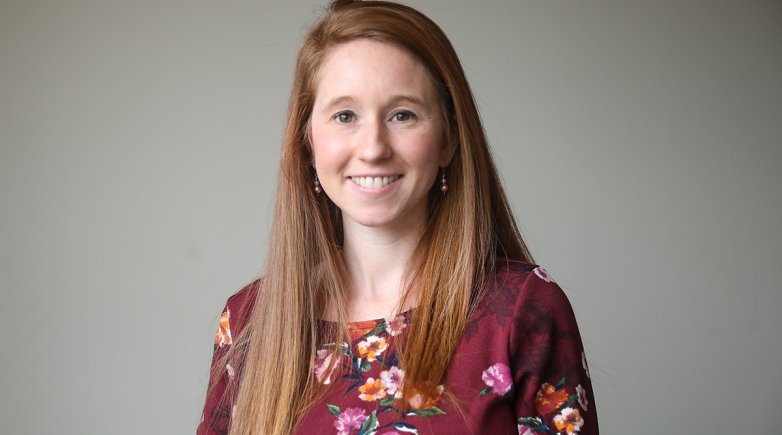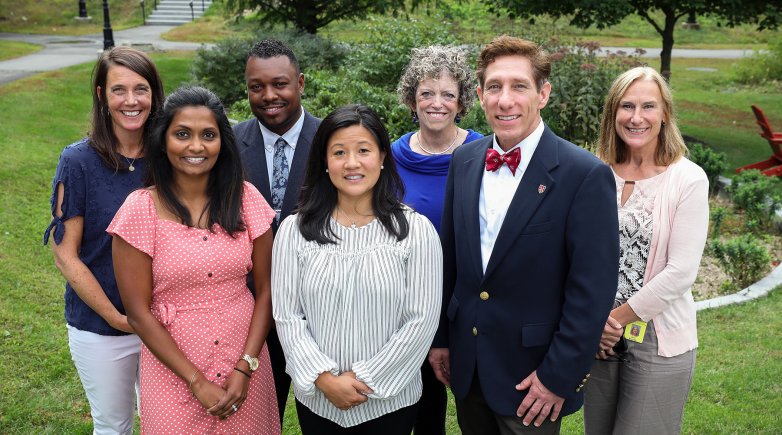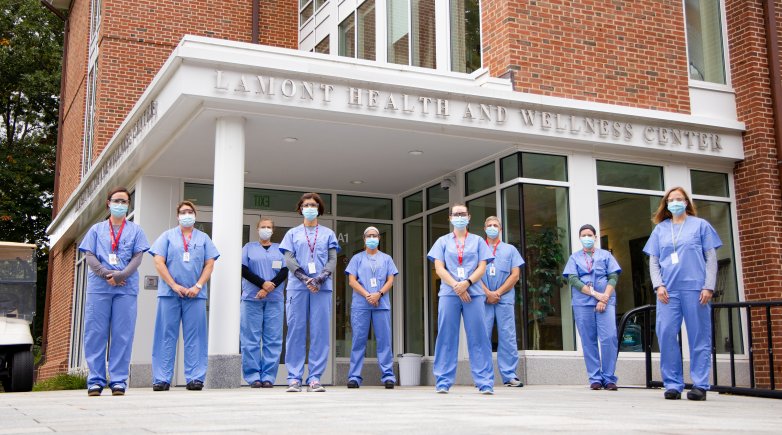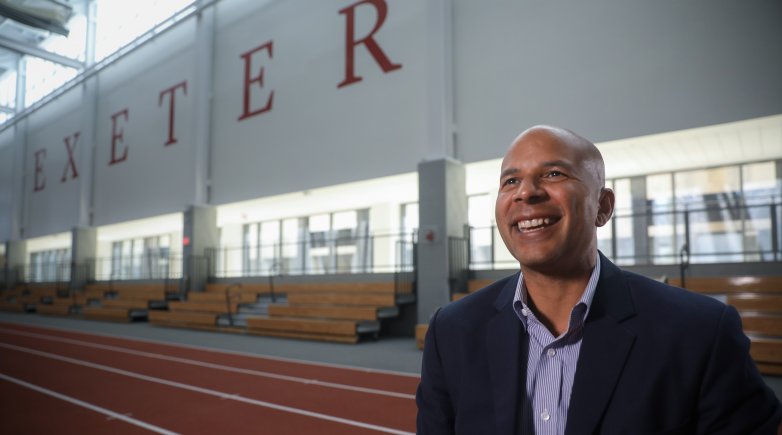A conversation with Exeter's registered dietitian and nutritionist Tina Fallon
“An apple a day keeps the doctor away.” Boundless catchphrases relate to nutrition and health. Registered dietitian nutritionist Tina Fallon helps Exeter students navigate outdated sayings, fad diets and various misconceptions that exist around food and health. In her work, Fallon strives to help students build a healthy relationship with food, one that is nourishing to support health and well-being.
“Food should be enjoyable,” she says. “If you want to have dessert, have dessert, but it’s important to find balance in your diet.”
A New Hampshire native, Fallon came to Exeter in the fall of 2019 after professional stops that included the University of Massachusetts Lowell and Stony Brook University, where she worked with students to support their dining needs on campus, worked with Division I athletes to achieve strength and fitness goals, and provided general nutrition counseling. Along the way she started her own practice providing counseling to clients and creating meal plans to meet their individual nutritional needs. She says she was drawn to the opportunity at Exeter to continue her work with athletes, the chance to collaborate with dining services, and to work with adolescents to support their nutritional and health needs. She cites her favorite part of the job as the one-on-one time she gets with students to share information that empowers them to make healthy choices.
We sat down with Fallon to talk about her approach to fueling young minds and bodies and how she’s stayed connected with students during their time away from campus.
Why is nutrition so important for adolescents and Exeter students in particular?
This is really the time when our students are developing their relationship with food and also the first time that many of them are away from home. Here our students have more autonomy in their food choices, and it's so important, especially at their age, to make nutrition a priority. If they’re not eating, they’re going to feel it, and their ability to focus on classes and schoolwork is going to decrease.
How do you help students create a balanced diet?
I encourage any student, if they're interested, to schedule a nutrition consultation with me. Meetings could be a one-time thing, like if a student needs to know what gluten-free options are available to them, or we can schedule monthly or weekly meetings if a student has specific nutrition goals. It’s up to the individual, and I’m here anytime they need that support.
How do you partner with dining services to provide meal options for students who may be vegan, diabetic or gluten free?
My relationship with dining services is great. I have an open dialogue with them, and they value my nutritional recommendations, which are reflected in the options offered in the dining halls. For students who have a very limited or special diet, we will often work with the dining management team to ensure they have options in the dining halls. During our meeting, we will discuss what the student’s needs are and how dining can support them. The dining services team is excellent at accommodating our students. As an example, during the fall term we learned that those who follow a vegan diet would benefit from more vegan protein options. As a result, dining has done a great job improving the winter and spring menus to ensure our students have several options.
You started at Exeter at a unique time, just a few months before the pandemic hit. How have you maintained or created connections with students remotely?
I was blessed to have been able to work at Exeter for a few months during “normal times.” During these months, I was able to build connections with students through nutrition counseling appointments, sports nutrition talks for various teams and even a few informational events in the dining halls. At the start of the pandemic, I thought it would be great to support our students in a different, more creative outlet. I put together some videos that gave students instructions on how to make quick meals or snacks that didn’t require any kind of cooking skills and could be put together using food items they most likely already had in the cupboard. It was super fun. Also, depending on where students live, I’m able to continue to meet with them virtually. Some states and countries have restrictions on telehealth, but I would encourage any student interested in nutrition consulting to contact me, and we will see if that's something we can make work, depending on where they are. I am also looking forward to our students’ return to campus, so we can meet in person, socially distanced, wearing masks of course, or virtually.
How do you support students who may be struggling with body image or exhibiting behaviors of an eating disorder?
Unfortunately, messages from diet culture have skewed our beliefs about how someone’s body should look or what we should or shouldn’t eat. For anyone who is struggling, I let them know that it’s OK to seek support. It's OK to get help. When we have an individual with an eating disorder, it's really a team approach. Having that student work with me as well as a counselor and a medical provider is really crucial. Having support from all sides is going to be really important in recovery, in building that healthy relationship with food and body. The sooner that a student gets the support they need, the sooner they can feel better about themselves and have that positive relationship with food.



